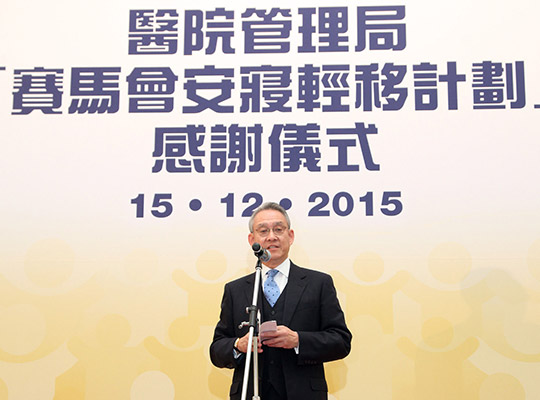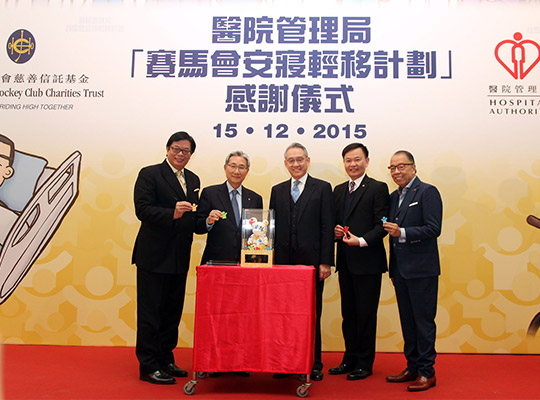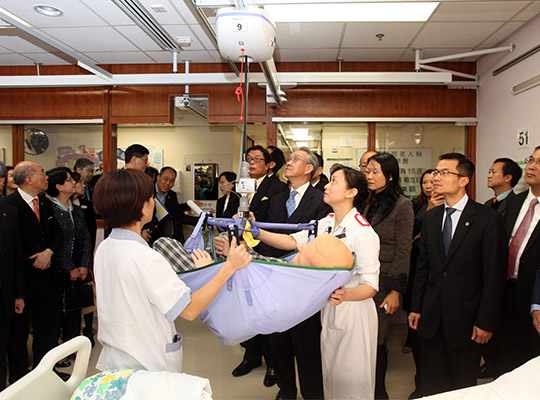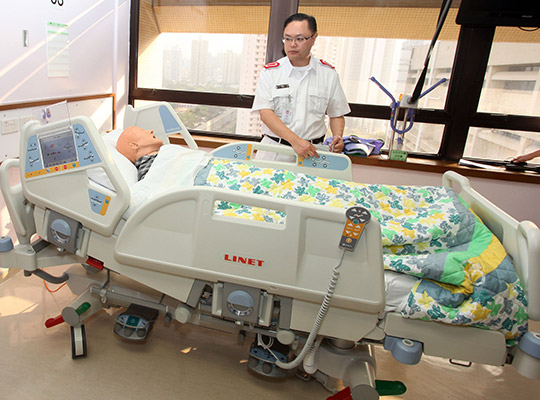

Community & Charities
Medical and Health
Jockey Club enhances public hospital facilities, benefiting patients and nursing personnel
15/12/2015
To provide patients and nursing staff with a safer and more comfortable environment, The Hong Kong Jockey Club Charities Trust has granted the Hospital Authority (HA) a HK$253 million donation to implement the Jockey Club Inpatient Facilities Modernisation Scheme, involving the installation of ceiling hoists and electrically-operated beds at all public hospitals in Hong Kong. The provision of 6,000-plus electrically-operated beds has already been completed at all public hospitals, while the installation of 520 ceiling hoists will be completed by phases in the coming two years.
The electrically-operated beds installed under the Scheme not only allow patients and carers to adjust the bed heights themselves, but also reduce medical complications by providing more effective musculoskeletal support and greater self-mobility. In neurosurgical and ICU wards, the enhanced features of these beds enable them to be adapted to patients’ specific needs, such as automatic lateral tilt therapy for the prevention of pneumonia and pressure ulcers. They also allow in-bed X-ray examinations which save patients from uncomfortable lifting, as X-ray cassettes can be placed under their backs. Also, patients can undertake walking exercises with the assistance of the ceiling hoists to facilitate recovery.
Over the years, the Club has provided long-standing support to HA to launch various new projects, which enabled it to provide enhanced healthcare services for residents. The 6,000-plus electrically-operated beds installed account for one-third of such beds in public hospitals, and over 50% of them are in ICU wards.
Every public hospital bed in those wards with highly dependent patients in public hospitals is now electrically-operated, creating not only a safer environment for such patients but also one where they can receive treatment with greater dignity. This will help raise the overall standard of Hong Kong's healthcare services by strengthening occupational safety and efficiency.
Chan Cheuk-kui, Ward Manager (Neurosurgery) of Tuen Mun Hospital, believed the new facilities funded by the Club could greatly minimise the risk of occupational injury. “To lift up or lower traditional hospital beds, you have to step on the pedal hard,” he explained. “You also need to bend down to turn the handle. Our backs and wrists can get injured easily. Now our wards are better equipped with the latest facilities. This will benefit both patients and nursing staff,” he said.
The Club has long been a staunch supporter of Hong Kong’s medical development. Besides the Jockey Club Inpatient Facilities Modernisation Scheme, the Trust has supported the establishment of public clinics and health centres across the city in the 1950s and the Centre for Health Protection in reaction to the SARS outbreak in 2003, helping Hong Kong prevent and fight epidemics. Last year, the Trust donated HK$1.3 billion to The Chinese University of Hong Kong to help establish a teaching hospital, which will benefit local residents particularly the sandwich class.





